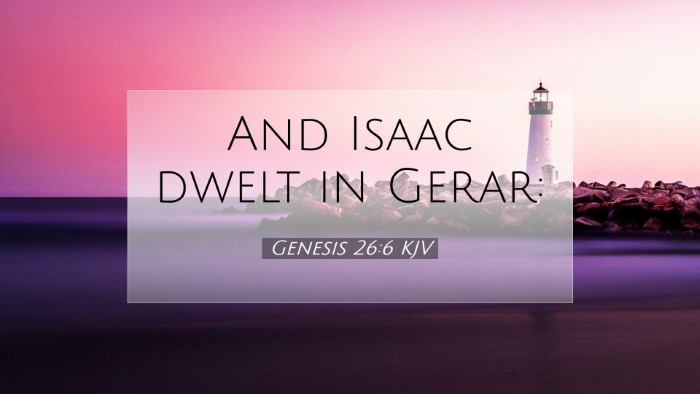Commentary on Genesis 26:6
Genesis 26:6 states: “So Isaac settled in Gerar.” This verse, while concise, opens up a myriad of spiritual and practical insights for pastors, students, theologians, and Bible scholars alike. The context in which Isaac chooses to settle offers rich lessons regarding faith, obedience, and God’s providential guidance in the life of a believer.
Contextual Overview
Before delving into the specifics of this verse, it is crucial to consider the broader narrative surrounding Isaac. In Genesis 26, Isaac faces a time of famine, similar to what his father Abraham experienced. This situation led Abraham to Egypt, but God instructs Isaac to remain in Gerar, the land of the Philistines.
Key Themes and Insights
-
Obedience to Divine Direction
Isaac's decision to stay in Gerar reflects profound obedience to God's command. Matthew Henry notes that although Isaac was tempted to depart for a more prosperous land, he chose to remain in the land God assigned him. Obedience, therefore, is a central theme. This serves as a reminder for believers to trust in God’s leading, even when circumstances seem dire or unpromising.
-
Divine Providence and Assurance
Clarke emphasizes that God's providential ordering of Isaac’s life was based on His promises to Abraham. By staying in Gerar, Isaac was positioned to receive blessings in accordance with God’s covenant. This reflects the continuity of God’s faithfulness through generations. For scholars, this highlights the theological concept of covenantal continuity and its significance in understanding the Old Testament narrative.
-
Identity and Security in God’s Promise
Barnes points out that Isaac finds his identity in the covenant promise made to his father. Rather than seeking his fortune elsewhere, Isaac contentedly resides in Gerar, illustrating a profound trust that God’s provisions would sustain him. This prompts a reflection for contemporary believers on resting secure in one’s identity as a child of God, derived from His promises.
-
Geographical and Spiritual Settling
The term “settled” is significant—it indicates a permanence and a choice to abide in the covenant blessings. Adam Clarke provides insight into spiritual implications of settling. It suggests a willingness to take root in God's promises. Pastors could consider how this encourages a lifestyle of commitment to God’s calling in ministry and service.
-
Faith Amidst Challenges
Remaining in a place of famine highlights Isaac’s faith. Despite the adversity, his settlement in Gerar symbolizes a reliance on God amidst hardship. As Henry posits, this represents not only physical sustenance but also spiritual nourishment that comes from steadfast faith in God’s provision, even when it is not immediately visible.
Historical and Cultural Context
Understanding Gerar's geographical and cultural significance enriches the interpretation of Isaac’s choice. Gerar was a territory inhabited by the Philistines, known for their conflicts with the Israelites. Settling in such a region not only required bravery but reflects Isaac’s father’s previous experiences there. It serves as a prophetic reminder about God’s protection over His people, leading into future events where conflicts with the Philistines would arise.
Theological Reflections
From a theological standpoint, this verse encapsulates the dilemma of every believer: to trust in God's plan despite immediate circumstances. It requires deliverance from the need to provide for oneself in a self-reliant manner and instead walks in the humility that God still governs all life’s pathways. The act of settling symbolizes an acceptance of God's will over one’s own plans.
Lessons for Modern Believers
-
Trust in God’s Timing
Like Isaac, believers must often wait for God's timing. In a culture of instant gratification, patiently dwelling in God's prescribed seasons is essential. Isaac's experience teaches that divine timing often coincides with testing faith and cultivating deeper reliance on God.
-
Community and Fellowship
Isaac’s presence in Gerar eventually fosters relationships with those who will form part of the covenant community. Believers today are encouraged to engage with their communities actively, contributing to fostering fellowship grounded in faith.
-
Living as Pilgrims
The notion of ‘settling’ does not equate to being stagnant. Rather, believers are called to view their lives as pilgrimages, navigating through life’s challenges while firmly planted in God’s promises. This can inform discussions on Christian living and eschatology within ecclesiological studies.
Conclusion
Genesis 26:6, while brief, encapsulates profound lessons about obedience, God’s faithfulness, and the nature of trust in God amidst challenges. It serves as a timeless reminder that God’s providential hand guides His people in both promising and dire circumstances. As we reflect on Isaac’s choice to settle, may it inspire contemporary believers to rest securely in the promise of God’s presence and provision, even when the way forward seems unclear.


